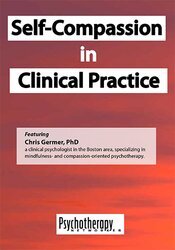

From depression and anxiety to addiction and trauma, a lack of self-compassion lies at the core of nearly every presenting problem. When therapy is effective, the therapist’s compassionate attitude seems to rub off on the client. Luckily, self-compassion exercises can also be taught and practised between sessions, making the therapy relationship more portable. This recording will show how to apply Carl Roger’s maxim “When I accept myself just as I am, then I can change.”
| File type | File name | Number of pages | |
|---|---|---|---|
| Manual - Self-Compassion in Clinical Practice (588.2 KB) | 33 Pages | Available after Purchase | |
| Manual - Self-Compassion in Clinical Practice - French (588.2 KB) | 33 Pages | Available after Purchase | |
| Manual - Self-Compassion in Clinical Practice - French (588.2 KB) | 33 Pages | Available after Purchase | |
| Manual - Self-Compassion in Clinical Practice - Italian (588.2 KB) | 33 Pages | Available after Purchase | |
| Manual - Self-Compassion in Clinical Practice - Italian (588.2 KB) | 33 Pages | Available after Purchase |
Christopher K. Germer, PhD is a clinical psychologist in the Boston area, specializing in mindfulness- and compassion-oriented psychotherapy. He is a Lecturer on Psychiatry, Part-Time, at Harvard Medical School and a founding faculty member of the Institute for Meditation and Psychotherapy. With Kristin Neff, PhD, Dr. Germer developed the empirically-supported, 8-week, Mindful Self-Compassion program. He conducts workshops and lectures internationally on mindfulness and self-compassion, is co-editor of Mindfulness and Psychotherapy and Wisdom and Compassion in Psychotherapy, and author of The Mindful Path to Self-Compassion.
Speaker Disclosures:
Financial: Christopher Germer is in private practice. He receives a speaking honorarium from PESI, Inc. He has no relevant financial relationships with ineligible organizations.
Non-financial: Christopher Germer is a member of the American Psychological Association; and the Association for Behavioral and Cognitive Therapies.
Self-compassion break
Working with difficult emotions
Shame
Backdraft
Finding loving kindness phrases
Loving kindness for ourselves
Giving and receiving compassion
Living with a vow
Pathways and stages
Please wait ...